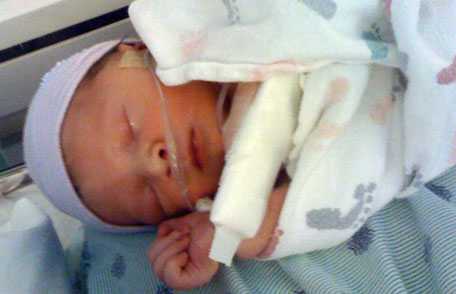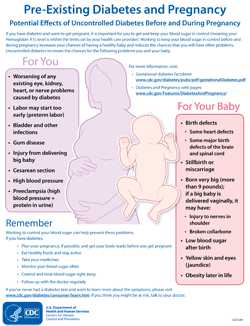Diabetes and Pregnancy: Erin’s Story
 If you are a woman with diabetes, you still can have a healthy baby. You need to take extra care before and during your pregnancy. Learn how to get ready for a healthy pregnancy.
If you are a woman with diabetes, you still can have a healthy baby. You need to take extra care before and during your pregnancy. Learn how to get ready for a healthy pregnancy.
Erin's Story - Being Pregnant with Diabetes
"I feel like I should change the title to 'Being Diabetic with Pregnancy,' because it seemed like I was a diabetic first and foremost who just happened to be pregnant. I knew less about my pregnancy than I did about my numbers.
"I was diagnosed diabetic three months before becoming pregnant and was just learning about diabetes and how it affected my body when I found out I was pregnant. I was ecstatic! I was overjoyed! Until I went to the fertility doctor who told me, 'You need to be in control of your diabetes. Your numbers need to be better or your child will have birth defects.' I was in shock. I had been trying to have a baby for three years and was hoping to enjoy the happy news for a little while.

"What I learned is that diabetes is not a joke; it is a disease that you have to think about every minute of every day."
"Shortly after, I visited my OB and realized I would have to work hard to manage my diabetes during pregnancy. I gave myself insulin four times a day and checked my sugar four times a day. I tracked these numbers and called the OB's office every day with the information. If I got busy or forgot, the office called me.
"With all the stress, I finally felt I was doing right by my baby when my initial appointment for an ultrasound of the baby's heart had to be rescheduled. They could not get me in for several weeks so I asked if I really needed the test being nearly full term. The doctor said that because I kept my diabetes under control, I was at the same risk as any other pregnant women. I was finally able to take a deep breath and know that I did the best I could for my baby.
"My beautiful, healthy baby boy was delivered at 39 weeks. There were no problems. He was perfect! But what I learned is that diabetes is not a joke; it is a disease that you have to think about every minute of every day. And when you are pregnant, you have to worry what it's now doing to you and to your baby. For me, it didn't go away after the baby was born, so now I have to think about my diabetes every minute of every day so I can raise my baby, teach him a healthy lifestyle in hopes he does not get diabetes, and, most of all, I want to be here when he has children."
CDC would like to thank Erin for sharing her personal story.
5 things you can do to help…
Controlling your diabetes before and during your pregnancy will help prevent such problems as birth defects, prematurity, miscarriage, and stillbirth.
1. Plan for a healthy pregnancy
- See your doctor before you plan to get pregnant and as often as recommended during your pregnancy. You might have to take medicines or change your current medicines, including those you take for diabetes.
- Control your blood sugar before and during pregnancy to reduce your chance of having a baby with a birth defect.
- Work with your doctor to prevent problems or catch them early (i.e., preeclampsia [pre-e-clamp-sea-ah]), or to prevent existing problems from worsening (i.e., kidney, eye, or heart disease).
2. Eat healthy foods and stay active
- Work with a dietitian or diabetes educator to develop a diabetes meal plan for yourself. Learn what and how to eat to keep your blood sugar in control.
- Stay active to help keep your blood sugar in control. Exercise regularly—before, during, and after pregnancy. Moderate exercise, such as walking briskly, 2 hours and 30 minutes per week (i.e. 15 minutes twice a day, 5 days a week) is a good goal if your doctor is okay with it.
3. Take your medicines
- Follow your doctor's advice.
- Take your medicines as directed, including insulin (in-suh-lin) if ordered by your doctor.
4. Monitor your blood sugar often
- Be aware that your blood sugar can change very quickly, becoming too high or too low. What you eat, how physically active you are, and your growing baby will change your blood sugar many times during the day.
- Check your blood sugar often—as directed by your doctor and any time you have symptoms.
- Know what blood sugar levels mean. Learn how to adjust what and when you eat; how physically active you are; and, if prescribed, how much insulin to take depending on your blood sugar tests.
5. Control and treat low blood sugar right away
- Check your blood sugar right away if you have symptoms.
- Treat low blood sugar quickly. Always carry with you a quick source of sugar, like hard candy or glucose tablets.
- Wear a medical alert diabetes bracelet.
Blood Sugar Levels
Even if you have kept your blood sugar in good control before you get pregnant, it can be harder to keep control during pregnancy. But, it's important to do your best! The American College of Obstetricians and Gynecologists (ACOG) says you should try to keep your blood sugar above 70 mg/dL and below these levels:
| ACOG Recommendations | The Levels My Doctor Recommends | |
|---|---|---|
| Before meals | 95 mg/dL or lower | |
| 1 hour after eating | 130 mg/dL or lower | |
| 2 hours after eating | 120 mg/dL or lower |
Blood Sugar is measured in milligrams/deciliter (mg/dL)
Your doctor might recommend different blood sugar levels. Ask your doctor to write in the chart above the levels you should have.
View and print Blood Sugar Levels chart [1.3 MB]
High Blood Sugar
Your blood sugar is high when the numbers are 130 mg/dL or higher. High blood sugar can
- Make you thirsty
- Cause headaches
- Make you go to the bathroom often to urinate (pee)
- Make it hard to pay attention
- Blur your vision
- Make you feel weak or tired
- Cause yeast infections
Low Blood Sugar
Your blood sugar is low when the numbers are 70 mg/dL or less. Low blood sugar is also called hypoglycemia (hi-poh-gli-see-me-ah). Low blood sugar can
- Make you feel hungry
- Make you sweat
- Cause headaches
- Cause weakness
- Make you feel dizzy or shaky
- Make you feel anxious or cranky
- Cause you to feel confused
- Make your heart feel like it's beating too fast
- Make you look pale
If you notice any of these signs or symptoms, check your blood sugar. If it is low, chewing 3-4 glucose tablets is best. If you don't have glucose tablets, eat or drink a source of quick sugar—like 4 ounces of fruit juice or soft drink (not diet). Check your blood sugar again in 15 minutes. If it's not better, eat or drink a source of quick sugar again. When you
More Information
More Information
- Page last reviewed: November 9, 2015
- Page last updated: November 9, 2015
- Content source:
Error processing SSI file


 ShareCompartir
ShareCompartir

